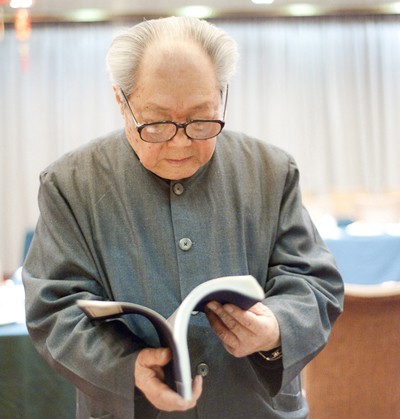Feng Qiyong, renowned Chinese academic, has passed away on Sunday at the age of 95.
Widely known for his contributions to Redology, the study of the 18th-century Chinese novel "A Dream of Red Mansions," Feng led the team that worked on the 1982 version of the novel. With its numerous corrections and annotations, this version is regarded as the bestselling edition of the Chinese classic.
Feng authored more than 20 books on Chinese literature and history, and served as the chief editor for dictionaries on "A Dream of Red Mansions" and encyclopedias of Chinese art.
During the height of Cultural Revolution, Feng secretly copied "Red Mansions" by hand, which he finished by June 1967, according to the Global Times.
"To me, this handwritten version is as precious as my own life," Feng was quoted to have said.
According to Feng's preface in his autobiography "Rain and Snow: The Personal Reminiscences of Feng Qiyong" published in the Jan. 17 edition of the state-owned People's Daily newspaper, he endured torture during the Cultural Revolution to eventually become the head of the team that edited and proofread "A Dream of Red Mansions" in 1975 as well as spearheading the establishment of the Chinese Research Institute of Redology and the Chinese National Academy of Arts.
In addition to Redology, Feng also made major contributions in classic Chinese literature, art and archeology, with the most notable being the rediscovery of the route that the legendary Tang Dynasty Buddhist monk Xuanzang, who served as the inspiration for the Ming Dynasty novel "Journey to the West", once traveled on his return journey to China from India.
"I went to the Xinjiang Uyghur Autonomous Region 10 times and climbed the Parmirs Plateau three times to verify the Ancient Wahan Route that Xuanzang took when he first reentered China," Feng wrote in his autobiography.
"After that, I traveled all the way from the ancient city of Milan, the Lop Nor salt lake, the ancient city of Loulan, and the Longcheng, Bailongdui and Sanlongsha areas to the Yumen Pass to finally confirm the last part of the route on which Xuanzang traveled from Yutian, an ancient Western kingdom, back to Chang'an, the then capital of the Tang Dynasty."
Meng Xianshi, a professor at the School of Chinese Classic at Renmin University of China, praised Feng's "persistent" approach to his research over the years.
"Mr. Feng had a hard life, but he chose not to forget these ordeals. In fact, to some degree, he was grateful to have experienced these ordeals," Meng wrote in his review of Feng's autobiography.



























